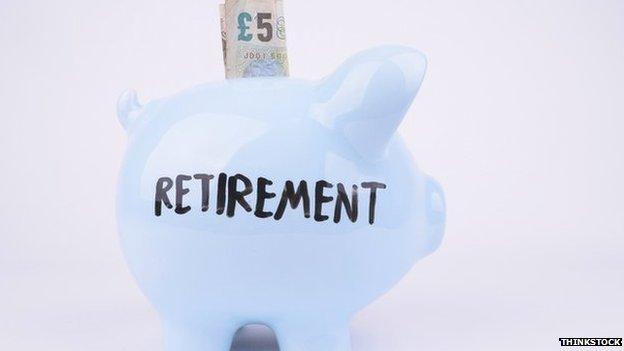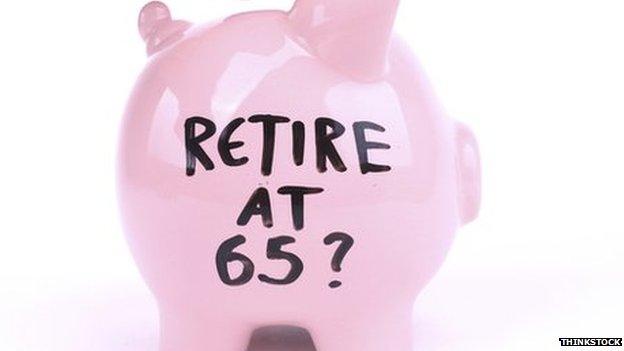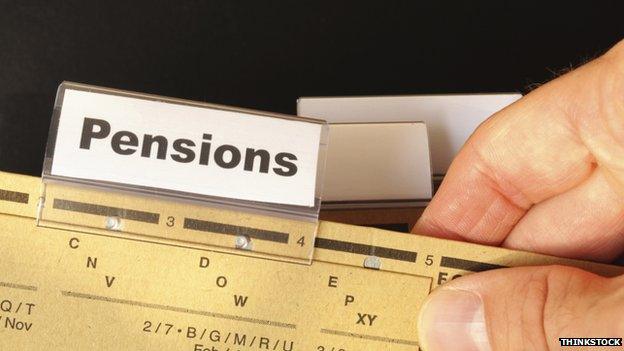Daily question: What does the future hold for Scotland's pensioners?
- Published
As the people of Scotland weigh up how to vote in the independence referendum, they are asking questions on a range of topics.
In this series, we are looking at those major questions and by using statistics, analysis and expert views shining a light on some of the possible answers.
Here, we focus on the issue of pensions, and what might happen to them in the cases of a "Yes" or a "No" vote.
Do you have a referendum question? Let us know by....
Emailing newsonlinescotland@bbc.co.uk.
We can also be found on Twitter @bbcscotlandnews, external
And on Facebook, external.
Dozens of news website users have been asking pensions-related questions, including Philip Derivaz, Joanna Higgs, Patrick Swift, D.G.Begg, Marianna Fletcher Williams, Colin Wilson, Harry Sutherland, Ian Brown and Edwin Robertson. And this came from Susan Woods who asked: "Who will pay my state and NHS pension after a yes vote? Will it still increase as it does now? Will this be affected by currency decisions?"

In a sentence, what are both sides saying?

The Scottish government says current pensioners would hardly notice a difference in an independent Scotland, and in fact they've even said they'd up the amount paid in state pensions.
The "No" campaign say the Scottish government couldn't afford the bill for state pensions as they are now, let alone improve them, and people's work pensions or occupational pensions will run into difficulties because of cross-border rules.

And what exactly are they saying about the state pension?

Both sides agree that it's very important that the elderly do not suffer in any transition, and for a lot of people nothing noticeable would change at all. The UK government have agreed that if you've been building up an entitlement to a UK pension, that will be honoured, but it might be dished out via the Scottish Pensions System rather than the UK one. Last year, £1.2m UK pensioners living overseas continued to receive their pensions through a series of bilateral and international arrangements. That's likely to be the case in an independent Scotland.
It's a more complicated picture for those who haven't retired yet. Any future entitlement for work done in Scotland after independence would be paid by the Scottish government. If you're in a generation that would straddle that independence date, then some of your pension would come from London and some from Edinburgh depending on the percentage of your working life which has been in each country.

What has the Scottish government promised?

The Scottish government has guaranteed that pensions would be single-tier to make the system simpler and help those on lower incomes, starting at £160 per week.
Like the UK government they've also said pensions would be triple-locked. That means that the SNP guarantee pensions will rise by at least 2.5%, inflation, or average earnings.
They've also said they'd look at the possibility of lowering the retirement age.

And what does the "No" campaign say about that?
Gordon Brown: ''It is right to keep our British pensions''
They say that a Scottish government couldn't afford the promises they have made, without big cuts in other areas of the budget.
Scotland's population is ageing faster than the rest of the UK, and the working-age population is smaller, which means fewer people making national insurance contributions to fund more older people. But, although there are proportionately more older people in Scotland, life expectancy is lower, so the Scottish government also say they want to look into the possibility of delaying that rise in retirement age.
This would certainly be a costly move. It's worth bearing in mind that if people retire earlier, not only does that mean an extra cost of more state pension payments, but the loss in Gross Domestic Product because that group wouldn't be working. The UK Department of Work and Pensions forecast the loss to GDP would be around £9bn between 2026 and 2036.
The Better Together campaign has claimed that Scotland pays 8% of UK National Insurance but receives upwards of 9% of the benefits, and that gap between contributions and returns will rise from £425m to £700m per year over the next 20 years.
State pension payments
Per head, 2012/13
£1276
Scotland
£1283
England
-
Including other pensioner benefits:
-
England £1725 / £1803 Scotland
During a speech the former prime minister Gordon Brown claimed these figures were taken from previously unpublished data from the UK Department of Work and Pensions. The Department say that they have not published anything which reflects that information, and their data is not presented in that manner, so I'm not able to check those particular statistics.
However, DWP figures do show that in 2012-13, when it comes to state pension payments, Scotland received £1,276 per head compared with £1,283 across the UK. But when you add in additional benefit payments to pensioners - disability, housing benefits, pension credits, the figure flips round. Across the UK total pension expenditure was £1,725 a year per head, and in Scotland that figure was higher, at £1,803 per head.
DWP figures also say that the Scottish government's extra pension promises would cost an extra £210 per working-age person per year over the next 20 years. That figure costs in the figure for keeping the retirement age at 67, which the Scottish government have only said they are "considering", and also assumes that the working-age population will stay the same, and the Scottish government are planning for it to grow, which would lower that total.

What's the future of the state pension if Scotland stays within the UK?

Paying the pensions bill is difficult for the Westminster government too. The ageing population has meant the government has pushed up the retirement age. All Westminster parties have agreed to honour the triple-lock on pensions, but many are questioning whether the UK can really afford this high bill either.

Now, what about private pensions?

Private pension funding is much more straight-forward, if you've put money in to an investment pot, you hope to get it back when you retire with a little interest. The issues around the referendum arise because of EU rules.
In an independent Scotland, overnight all UK-wide pensions would become cross-border. A company scheme could have employees in both Scotland and the rest of the UK who have all paid into the scheme, and money will have to be paid out to them in their respective countries, and potentially in their different currencies.
EU rules state that cross-border schemes need to be fully-funded at all times. Most UK pensions are not fully funded at all times, if everyone wanted to take all their money out all at once, they wouldn't be able to. So overnight there would be "black holes" in lots of UK private pension schemes. To fill the gap it's possible that pensioners would have to pay more in, making pensions more expensive, or the schemes might be split into separate schemes for Scotland and the rest of the UK - again this is likely to cost more.
The Scottish government says that the EU would allow extra time to iron out the problems, and make sure that funds were able to adapt. The Institute of Chartered Accountants of Scotland, external doesn't think the time frame proposed would be long enough.